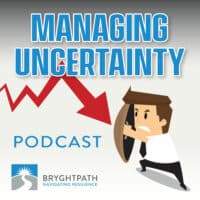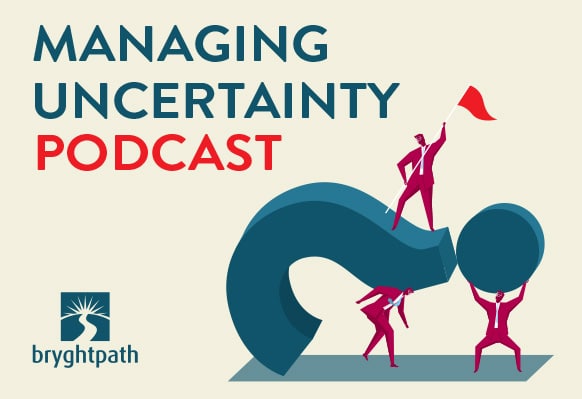
In this episode of the Managing Uncertainty Podcast, Bryghtpath Principal & Chief Executive Bryan Strawser discusses strategies and tactics for supporting your crisis management team (and others) during a prolonged crisis such as we’ve seen with the COVID-19 pandemic.
Topics discussed include critical incident debriefings and counseling, managing stress, checking in with your team, stress management tactics, vacations and rest, compensation & benefits, and taking care of each other across the emergency management/crisis management community.
Related Episodes & Blog Posts
- Episode #37: Taking care of the team during a crisis
- Blog Post: How 3 companies have managed the COVID-19 pandemic
- Blog Post: 10 Ways an effective crisis manager survives a crisis
- Blog Post: 3 essentials for thriving in a crisis
Episode Transcript
Hello, and welcome to the Managing Uncertainty Podcast. This is Bryan Strawser, principal and chief executive here at Bryghtpath.
In this week’s episode, I want to talk about how to support your crisis team during a prolonged crisis. If you think about it right now, we’re fiveish months into the COVID-19 pandemic here in the United States.
And if you’re a crisis leader in another country, you may be seven, eight or nine months into this situation right now, likely without much of a break away from the pandemic, or at least that’s what I’ve been experiencing since about February or so when we started seeing cases or started having the buildup here within the United States.
For most of us, I think we’re deep into supporting our team. We’re having daily or multiple times a day and weekly crisis team calls, executive calls. We’re briefing executives. We’re talking to the board, or if you’re in my case, you’re advising clients and helping them be successful as they try and navigate through this crisis situation.
So the big question for this episode is how can you, as the crisis or business continuity leader, make sure that you’re taking care of your team throughout this prolonged crisis situation that we found ourselves in with COVID-19 and the pandemic. And complicating this, I think on top of the usual strain and challenges and emotions that we go through in a crisis, we’re dealing with a set of just unprecedented stresses. We’ve been teaching our kids because our kids haven’t been able to go to school. We’ve had to deal with childcare issues or a complete lack of childcare. We’ve been balancing the roles of parents and employees.
We’ve been balancing being a spouse and being an employee, and we’re dealing with this multitude of remote work and work from home issues that we’ve all had to work through ourselves, and with our teams, and with our partners and stakeholders.
So we have all these unusual stresses, and all of that is on top of what we’re dealing with as folks who work in crisis management. I think, in particular, we’re dealing with the stresses of this, having teams of folks that in some cases that work for us that manage crisis and continuity issues. And we’re dealing with our crisis teams and executives that are also going through the same set of disruptions and emotions and challenges of a global pandemic with all of these unusual stresses that we’ve put on ourselves. So what can you do? What are some of the things that you can do to make sure you’re taking care of the team?
I think the first is your own kind of mental acknowledgment that we’ve been through some unprecedented time here, and if nothing else is, it should give us, or we should approach some of these situations with, I think of it as almost a sense of grace. That I know we’ve all been through this challenge and that we’re all human, we’re all going to make mistakes. We’re all going to have bad times and emotional moments, but I think we have to take those in stride. We have to realize that there’s a lot of hidden stress and hidden anguish that’s going on with our coworkers and that we need to approach that with some grace and understanding.
The second is to think about how you can do mental health check-ins with your team. I’m not telling you here to be, or think that you’re able to act as a professional in these areas, but there is no harm as you’re talking with your team, in asking, “How are you doing?” Like, “How are you doing with what’s going on?” Things we want to look for is that our teams have moralized, that they have regular contact with family and friends, and coworkers, and others that are their normal moral lines, the normal things and strategies and tactics and relationships that they use to stay balanced and stay centered on what’s going on. As we find employees, or stakeholders, or partners that are working through some challenges, or we know that there are some challenges because we know our team.
I think having a good understanding of what your company has available to you in terms of resources, to connect them with. You may have an employee assistance program or counseling program. You may have healthcare benefits that allow them to connect with counseling resources. There might be counseling resources in your community that they can take advantage of. But I do think maintaining contact with your team, checking in with them on their own mental health, and understanding the resources that are available to them are really important to make sure that the team is being taken care of.
As managers and leaders, we also need to look for the fact that, are we getting adequate rest and time away and time off. Or in the same way, are we making sure our team is getting that, that they are getting adequate rest, that they’re getting time away, that they’re getting time off? We think about that even in a short term crisis, right? I mean, we’ve talked in previous episodes about making sure people got a break, making sure that folks had some time away from the situation when you’re talking about a five-month global pandemic that we’re still working through. Then absolutely, we have to think about how do we make sure folks get time away that they’re able to disconnect. They’re able to get that mental health break that lets them continue to function at the peak that we need them to do.
So that’s something we need to monitor is time off and time away, adequate rest, going on vacation, so to speak or actually taking a vacation. The pandemic is not going away. Another situation, another idea here is, and in some ways, I think we all do this, but it’s watching for folks who were headed to the basement. By basement I mean, they’re headed to that bottom part of their brain where the fight or flight syndrome leads, that they’re kind of losing. They’re kind of losing some of that emotional intelligence that we so value in folks that are working in crisis management, business continuity. You need folks to watch for this in yourself to see when you are headed to the basement when that fear in fight or flight syndrome kicks in. So we want to help folks not get there. We want to also recognize when someone is there and then we need to get them away from the situation for a while until they regain perspective and their equilibrium is back.
We can also think about things like, should there be additional pay or hazard pay, so to speak, additional compensation for folks that are working in crisis management or business continuity, because they’re dealing with… really dealing with a set of unprecedented challenges. It’s difficult for folks in these roles to get away. Then lastly, I think I want to think about the traditional end of a crisis. I mean, we’re used to crisis situations that typically wrap up earlier than that a five-month ongoing global pandemic, but think about what we always do at the end of a crisis. We capture lessons learned. We think about critical incident debriefings with trained professionals. We think about debriefing as a team about perhaps debriefing individually, bringing in counselors that can help us work through this process.
This isn’t any different, except that we don’t know when the end is going to be. At five months in maybe, it’s time for us to think about some of those critical incident debriefings, maybe it’s we do some of those now in order to head off problems in the longer term. But I would not hesitate to think about how you can do some of this now for this rather prolonged situation we find ourselves in. There’s certainly no shame or weakness and admitting that you might need to seek these kinds of conversations after the incident has ended. In fact, I think it requires more courage to step forward and say, “I need to talk to someone about how I’m feeling, how I’ve been managing stress through this situation.”
There is value in doing this with a peer or with a friend that’s in this field, but I don’t think in any way that makes up for talking with a trained professional that can really help you sort through the emotions that you’re going through, because otherwise someone… the emotions that you’re going through, I should say, as somebody who has had to lead through this prolonged crisis situation, you can always go to your peers. You can always call me if you need to, to talk about some of these things. If that will help your mental health, I will be happy to give you the time to work through that. But I don’t think it makes up for talking with a trained professional who has the appropriate educational and counseling background to assist you.
So this is some ideas about how to support the team during a prolonged crisis, how to make sure that your crisis team and your executives and your own team are okay, that you’re managing through this.
That offer stands. If you’re a crisis manager and you want to talk about the stress that you’ve been through, and you want to talk to someone who will listen and give you the most sympathetic advice that can be given, call me.
You can find me at Bryghtpath at 612-235-6435 or via email at contact@bryghtpath.com.
That’s it for this edition of the Managing Uncertainty Podcast.
We’ll be back next week with another new episode.
Be well.

